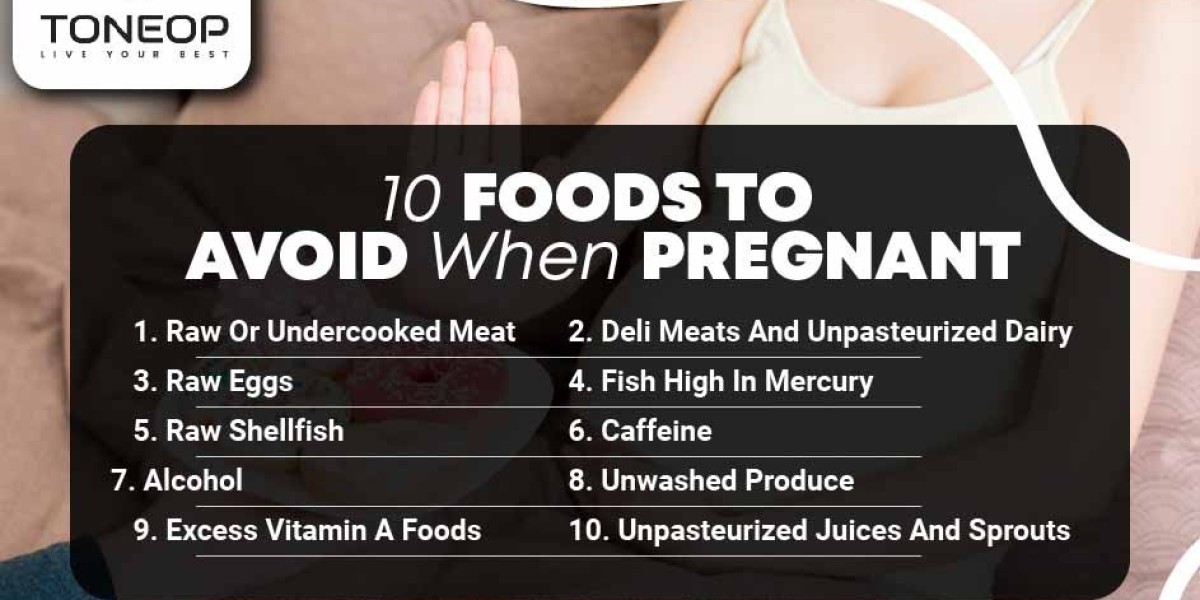Beyond food safety, a well-balanced diet filled with nutrient-rich foods is equally important to support a healthy pregnancy. Essential nutrients such as folic acid, iron, calcium, and omega-3 fatty acids are key for fetal growth and development. Ensuring a diet that avoids harmful foods while focusing on nutrient intake helps promote the health of both mother and baby, lowers the risk of birth defects, and enhances pregnancy outcomes.
For expectant mothers seeking guidance on food safety and nutrition, this blog provides a comprehensive list of foods to avoid during pregnancy, along with important nutrition tips. Let’s dive in!
1. Foods to Avoid During Pregnancy:
Here’s a breakdown of foods pregnant women should avoid for better maternal health:
1. Raw or Undercooked Meat:
Meats like beef, chicken, and seafood that are undercooked can contain harmful bacteria such as Salmonella, E. coli, and Listeria, which may cause severe illnesses, including miscarriage or premature birth. Properly cooking meat destroys these bacteria.
2. Deli Meats and Unpasteurised Dairy:
Deli meats and unpasteurised dairy can contain Listeria, which may cross the placenta and cause miscarriage, stillbirth, or severe illness in infants. Always choose pasteurised dairy products, and heat deli meats before eating to reduce risk.
3. Raw Eggs:
Raw or undercooked eggs may carry Salmonella, leading to food poisoning. It’s best to avoid foods made with raw eggs, such as certain dressings and desserts.
4. Fish High in Mercury:
Fish like shark, swordfish, and king mackerel are high in mercury, which can affect fetal brain development. Instead, opt for low-mercury fish like salmon and shrimp.
5. Raw Shellfish:
Shellfish such as oysters and mussels may contain harmful bacteria that can cause severe illnesses. Always cook shellfish before consuming.
6. Caffeine:
While moderate caffeine intake is generally considered safe, excessive amounts may lead to low birth weight or miscarriage. Limit caffeine to safe levels during pregnancy.
7. Alcohol:
Even small amounts of alcohol can be harmful during pregnancy, potentially leading to fetal alcohol spectrum disorders (FASD). It’s best to avoid alcohol entirely.
8. Unwashed Produce:
Unwashed fruits and vegetables may carry harmful bacteria or pesticides. Be sure to thoroughly wash produce before consumption.
9. Foods High in Vitamin A:
Excessive vitamin A, especially from animal products like liver, can harm the fetus. Focus on getting vitamin A from plant-based sources.
10. Unpasteurised Juices and Raw Sprouts:
Unpasteurised juices and raw sprouts may carry harmful bacteria. Choose pasteurised juice and cook sprouts to reduce risk.
2. Pregnancy Nutrition Considerations:
Maintaining a balanced diet rich in key nutrients is vital for a healthy pregnancy. Here are some important guidelines:
- Macronutrients:
- Carbohydrates (whole grains, fruits, vegetables) provide energy.
- Proteins (lean meat, fish, eggs, legumes) support tissue and organ development.
- Healthy fats (avocados, olive oil, nuts) are essential for brain development.
- Micronutrients:
- Folic acid: Prevents neural tube defects.
- Iron: Supports blood volume and prevents anaemia.
- Calcium: Important for bone and teeth development.
- Vitamin D: Aids in calcium absorption and bone health.
- Hydration:
Drink plenty of water and limit caffeinated or sugary beverages.
- Food Safety:
Always wash produce, thoroughly cook meats, and follow safe food handling practices.
- Supplementation:
Prenatal vitamins for folate, iron, calcium, and vitamin D are recommended to ensure adequate nutrition.
Final Thoughts:
Avoiding certain foods during pregnancy is crucial for reducing the risks of foodborne illnesses and toxins that could affect fetal development. By making informed dietary choices and focusing on nutrient-rich foods, you can promote a healthy pregnancy and provide your baby with the best start. Always consult with a healthcare provider for personalized nutrition advice tailored to your needs.
FAQs:
1. What foods should I avoid when pregnant?
Raw or undercooked seafood, deli meats, raw eggs, high-mercury fish, unpasteurised dairy, and raw sprouts.
2. What foods should I avoid at 5 weeks pregnant?
Raw meat, soft cheeses (unless pasteurised), caffeine, liver products, and alcohol.
3. Which fruits should I avoid during the first trimester?
Unripe papaya, pineapple, and grapes due to potential risks.
About ToneOp:
ToneOp offers health plans focusing on weight management, medical conditions, and fitness through diet, yoga, and naturopathy.
Visit our website:
https://toneop.com/blog/foods-to-avoid-during-pregnancy










